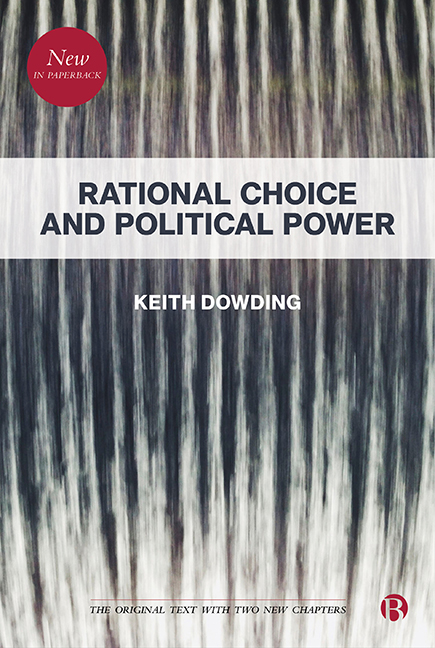Introduction to the New Edition
Published online by Cambridge University Press: 30 April 2022
Summary
This book was first published in 1991. It appeared in hardback and its initial impact was limited, as I recount in Chapter 9. However, over time it has had a greater impact on the literature, particularly bringing attention to the problem of collective action to those interested in power and the acquiescence of the weak to the dominant. I am pleased that Stephen Wenham, at Bristol University Press, was keen to see this book republished in paperback and e-form. My original publisher, Edward Elgar, retains the hardback rights but generously gave me the paperback and e-book rights. Edward Elgar had come into my office in my first year as a lecturer at Brunel University and asked if I had any book plans. Almost off the top of my head, I’d suggested a book using the tools of rational choice theory to examine political power. Edward was immediately interested, and I produced a book proposal that was enthusiastically endorsed by his reviewer, Brian Barry.
The idea of the book came out of my Oxford DPhil thesis, on Mancur Olson and the logic of collective action. In fact, it came out of one paragraph in that book, an aside, where I had suggested that the collective action problem could explain why people often seemed powerless. We did not need to posit contrary forces, ideology or behind-the-scene activities; people could be powerless all of their own. I wrote this up as a paper, ‘Collective Action and Political Power’, and gave it at various universities in the USA in early 1987. At that time, the Thatcher higher education cuts were in full swing, and there were few new academic jobs in the UK. I wrote to anyone in the States with whom I had had some contact and who could arrange for me to give a seminar, and contribute to my expenses, hoping to bring myself to the attention of academics. I touted my wares at Yale, Penn State, University of New Orleans and Tulane University, University of California Davis, Chicago University and Indiana University, Bloomington, returning with two potential one-year positions. In fact, however, I was then appointed to the Brunel University position.
- Type
- Chapter
- Information
- Rational Choice and Political Power , pp. ix - xivPublisher: Bristol University PressPrint publication year: 2019



